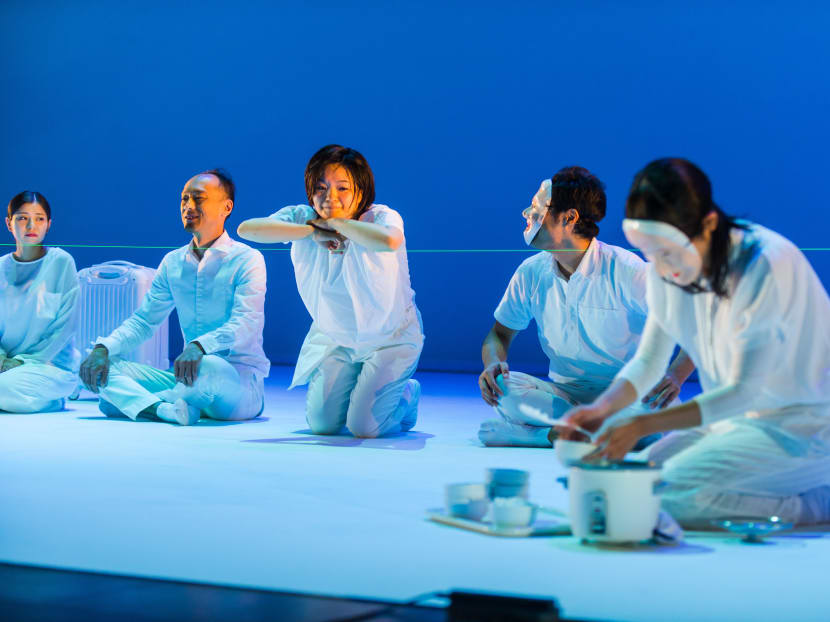Theatre review: Seed
SINGAPORE — “Eat well, live well. Isn’t that what life is all about?” In some other context, these words projected onstage during the final scene of Seed might come across as cliched. But after the chaos and uncertainty that unfolds in The Finger Players’ surreal and minimalist production, one cannot help but be struck by the piercing quality of such a simple parting message.

The Finger Players' Seed. Photo: Tuckys Photography
SINGAPORE — “Eat well, live well. Isn’t that what life is all about?” In some other context, these words projected onstage during the final scene of Seed might come across as cliched. But after the chaos and uncertainty that unfolds in The Finger Players’ surreal and minimalist production, one cannot help but be struck by the piercing quality of such a simple parting message.
First staged in Tokyo, playwright and director Chong Tze Chien and his all-Japanese cast present a series of loosely-linked narratives set in the backdrop of an all-too-familiar nuclear disaster that hints at the 2011 Fukushima tragedy, with death and food as recurring themes.
There is a woman who makes a journey from New York to Japan with her recently deceased husband, who travels with her in spirit — literally — to confront the ghosts of the past in his ancestral home in the countryside, which also happens to be inside the danger zone. There is also the husband’s enigmatically prescient older neighbour who awaits this reunion of sorts, stubbornly staying put as everyone else flees for their lives. Elsewhere, Russian cosmonauts are trapped in space, a television reporter grapples with sex and paranoia, and there is the constant reminder that food — rice, to be specific — is the glue that holds everything together. In Seed, one is reminded of the cosmological tapestry of Chong’s previous work The Book Of Living And Dying as well as fellow Finger Player Oliver Chong’s in-search-of-roots Roots monologue, where rice also figured prominently.
Two years ago, on a trip to Tokyo, this reviewer saw a range of artistic responses and reactions to the Fukushima catastrophe in galleries, museums and public spaces: From anger and rage to a sense of panic and helplessness in the face of a collapsed society to a more defiant galvanising call to action.
Seed seemingly points to yet another, almost inward-looking, way: A calm, zen-like acceptance of the order of things, which at the same time, is far from being fatalistic. In the face of tragedy, the ritual of eating binds us — as family, as part of this world — come what may.
This distilled world view is heightened by the manner of staging: With its hints of Noh influence (including the occasional use of masks), the all-white stage with its performers also all in white is like a blank slate, with the ingenious use of strings signifying everything, from rows of paddy fields to telephone lines to a television screen to Seed’s most visually haunting image: Weighted red strings descending from the ceiling like a rain of missiles or satellites. The theatre group’s inventive use of props also include a piece of luggage suggesting a planet or a satellite floating in space, and penlights flickering like stars.
In its examination of human nature amidst personal and social crises, Seed offers much food for thought and is an experience that is immensely satisfying.
Seed runs until Oct 31, 8pm, at SOTA Drama Theatre. Tickets from S$35 at SISTIC. In Japanese and English, with English surtitles.







